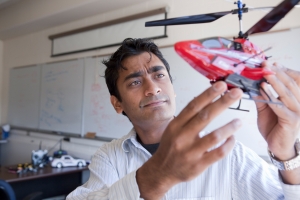-
CS Colloquium - Ashutosh Saxena: How should a robot perceive the world?

Tue, Oct 15, 2013 @ 03:30 PM - 05:00 PM
Thomas Lord Department of Computer Science
Conferences, Lectures, & Seminars
Speaker: Ashutosh Saxena, Cornell University
Talk Title: How should a robot perceive the world?
Series: CS Colloquium
Abstract: In order to perform assistive tasks, a robot should learn a functional understanding of the environment. This comprises learning how the objects in the environment could be used (i.e., their affordances). In this talk, I will present methods to represent and learn these affordances using data-driven machine learning algorithms. Our learning algorithm will be Infinite Latent CRFs (ILCRFs) that allow modeling the data with different plausible graph structures. Unlike CRFs where the graph structure is fixed, our ILCRFs learn distributions over possible graph structures in an unsupervised manner.
We then show that our idea of modeling environments using object affordances and (hidden) humans is not only useful for robot manipulation tasks such as arranging a disorganized house, unloading items from a dishwasher, but also in significantly improving standard robotic tasks such as scene segmentation, 3D object detection, human activity detection and anticipation, and task and path planning.
Biography: Ashutosh Saxena is an assistant professor in computer science department at Cornell University. His research interests include machine learning and robotics perception, especially in the domain of robotics in human environments. He received his MS in 2006 and Ph.D. in 2009 from Stanford University, and his B.Tech. in 2004 from Indian Institute of Technology (IIT) Kanpur. He is a recipient of National Talent Scholar award in India, Google Faculty award, Alfred P. Sloan Fellowship, Microsoft Faculty Fellowship, and NSF Career award.
In the past, Ashutosh developed Make3D (http://make3d.cs.cornell.edu), an algorithm that converts a single photograph into a 3D model. Tens of thousands of users used this technology to convert their pictures to 3D. He has also developed algorithms that enable robots (such as STAIR, POLAR, see http://pr.cs.cornell.edu) to perform household chores such as unload items from a dishwasher, place items in a fridge, etc. His work has received substantial amount of attention in popular press, including the front-page of New York Times, BBC, ABC, New Scientist, Discovery Science, and Wired Magazine. He has won best paper awards in 3DRR, IEEE ACE and RSS, and was named a co-chair of the IEEE technical committee on robot learning.
Host: Fei Sha
Location: Henry Salvatori Computer Science Center (SAL) - 101
Audiences: Everyone Is Invited
Contact: Assistant to CS chair
This event is open to all eligible individuals. USC Viterbi operates all of its activities consistent with the University's Notice of Non-Discrimination. Eligibility is not determined based on race, sex, ethnicity, sexual orientation, or any other prohibited factor.




